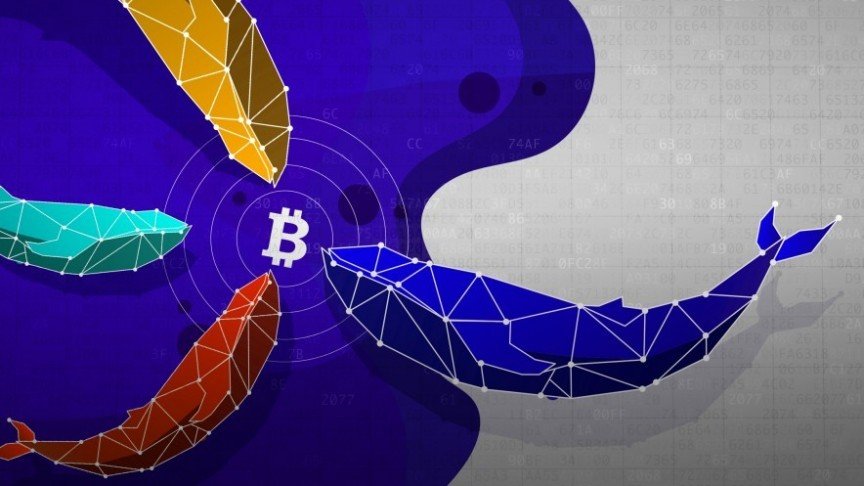Table of Contents
Over the next few years, jobs in most industries are likely to be exposed to and shaken by the impact of artificial intelligence(AI).
As artificial intelligence, especially generative AI, becomes more widespread, tools are emerging to augment or replace certain tasks, and some traditional work profiles are being replaced. As rethinking becomes necessary, the way people work will inevitably change.
However, while some tasks can be partially or fully automated, some tasks, especially those that require personal care, cannot be easily replaced by algorithms.
Artificial Intelligence Jobs: Which Jobs Will Be Most and Least Affected? Let’s learn about the outlook for artificial intelligence job decline.
Artificial Intelligence Job Outlook: Risky and Safe Industries
The evolving workforce landscape with the rise of artificial intelligence is a topic of intense debate. This important moment has transformed the way labor costs are recognized and managed, focusing on the interaction between automated systems and human capabilities.
Anna Tavis, clinical professor of human capital management at New York University, commented on these changes:
“Expectations are rising about potential labor cost efficiencies due to the introduction of AI. Although it is believed that AI could replace some tasks or parts of tasks currently performed by humans, it is important to note that these expectations may be ahead of their time. Nonetheless, given advances in AI, companies are preparing for major reorganizations.”
A study conducted by Indeed’s Employment Research Institute predicts a shift in the impact of technological advancements . While past innovations in computing and robotics largely replaced manual labor, the rise of generative AI is expected to primarily impact ‘knowledge workers’. Because the technology continues to learn specific skills associated with a particular role, it may enhance or transform some roles while not others.
According to recent AI job loss projections, 19.8% of jobs are at the highest potential risk, while 34.6% are at the lowest potential risk.
Artificial Intelligence Job Decline Statistics: Impact of Generative AI on Industry
The Recruitment Institute analyzed the number of skills listed in various job postings to identify thematic skills that help define which occupations are most and least exposed to potential changes brought about by artificial intelligence.
So what jobs will artificial intelligence replace? Let’s find out through the statistics on AI job decline below.
Research shows that tools based on artificial intelligence algorithms are most adept at software development, IT operations, help desk support, and math. On the other hand, they performed poorly on a variety of manual and interpersonal tasks.
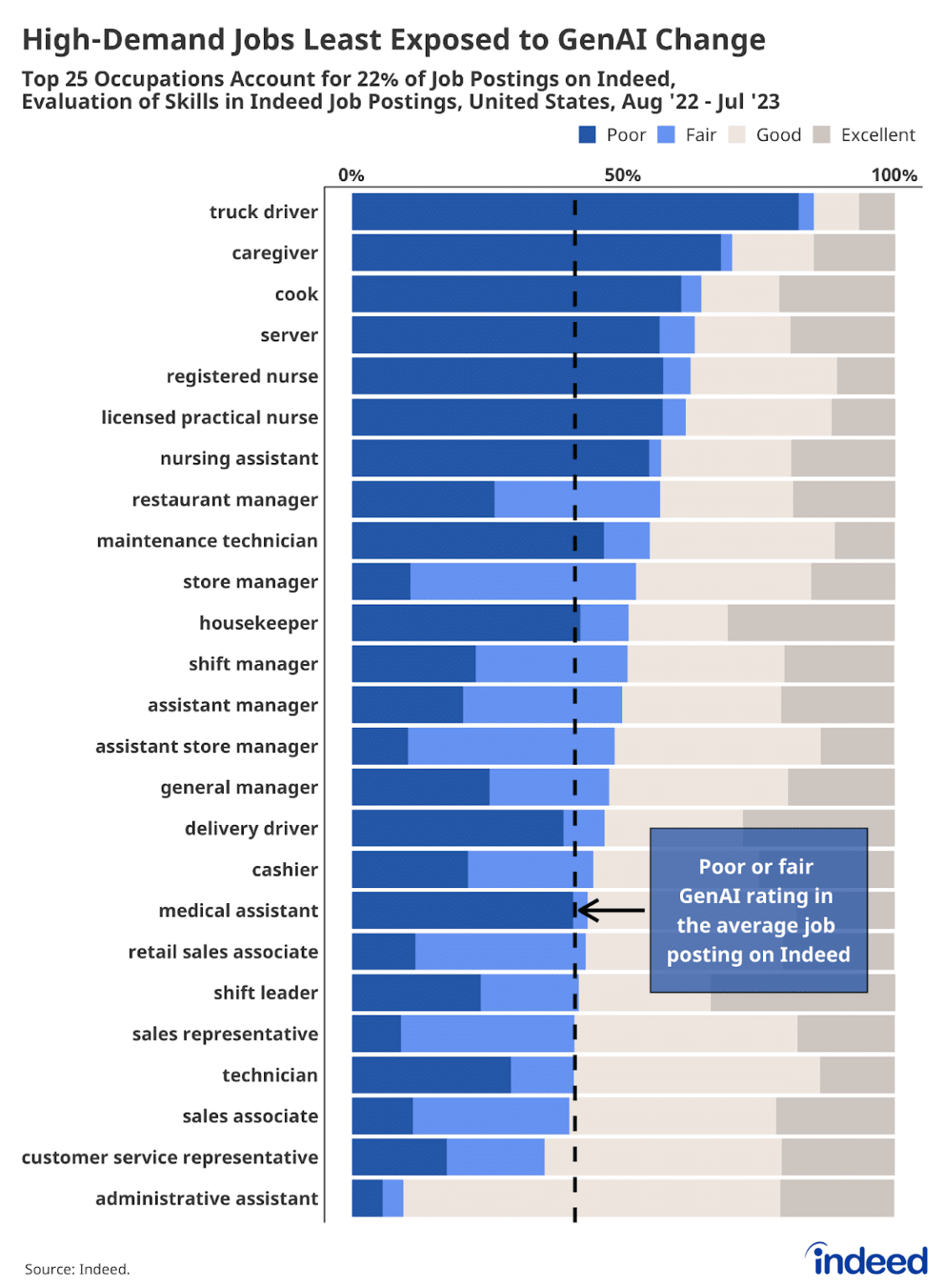
Artificial intelligence proficiency scores low in these skills, so job security may be guaranteed for the time being:
- Driver
- Beauty and Health
- Personal care and home health
- Nurse
- Parenting
- Food preparation and service
- Veterinary medicine
However, as labor markets around the world continue to adapt to the rise of remote work, the likelihood of job loss due to AI increases as the possibility of performing work remotely increases.
Large-scale language model: You can’t drive a truck or build a house.
Of the 25 most popular jobs on Indeed, 20 have lower exposure potential than the average job. Truck driving is the occupation least likely to be exposed to generative AI, with only 15% of truck driving skills rated as ‘excellent’ or ‘good’.
The research results are as follows:
“The occupations least likely to be exposed to generative AI, such as driving, cleaning and hygiene, and beauty and wellness, are also those least able to be performed remotely. “The more likely it is that work can be done remotely, the more likely that work will be exposed to changes driven by generative AI.”
“Historically, these are not occupations that have been disrupted by automation, and there is more evidence that these technological advances will impact a variety of workers in different ways than they have in the past.
“Generative AI is relatively adept at technical skills (and jobs), but significantly weaker at skills (and jobs) that require intuition, reasoning, and/or face-to-face manual work,” the study said.
This difference may be somewhat natural considering how generative AI operates. For drivers, large-scale language models (LLMs), the type that powers many generative AI tools, can plan a route on a map but not turn a steering wheel, but other forms of AI are what make self-driving cars possible. A point is worth noting.
But for software developers, job losses due to AI are much higher. It appears that machine learning could replace much of the human work required to write efficient code or write and summarize technical documents. /span>
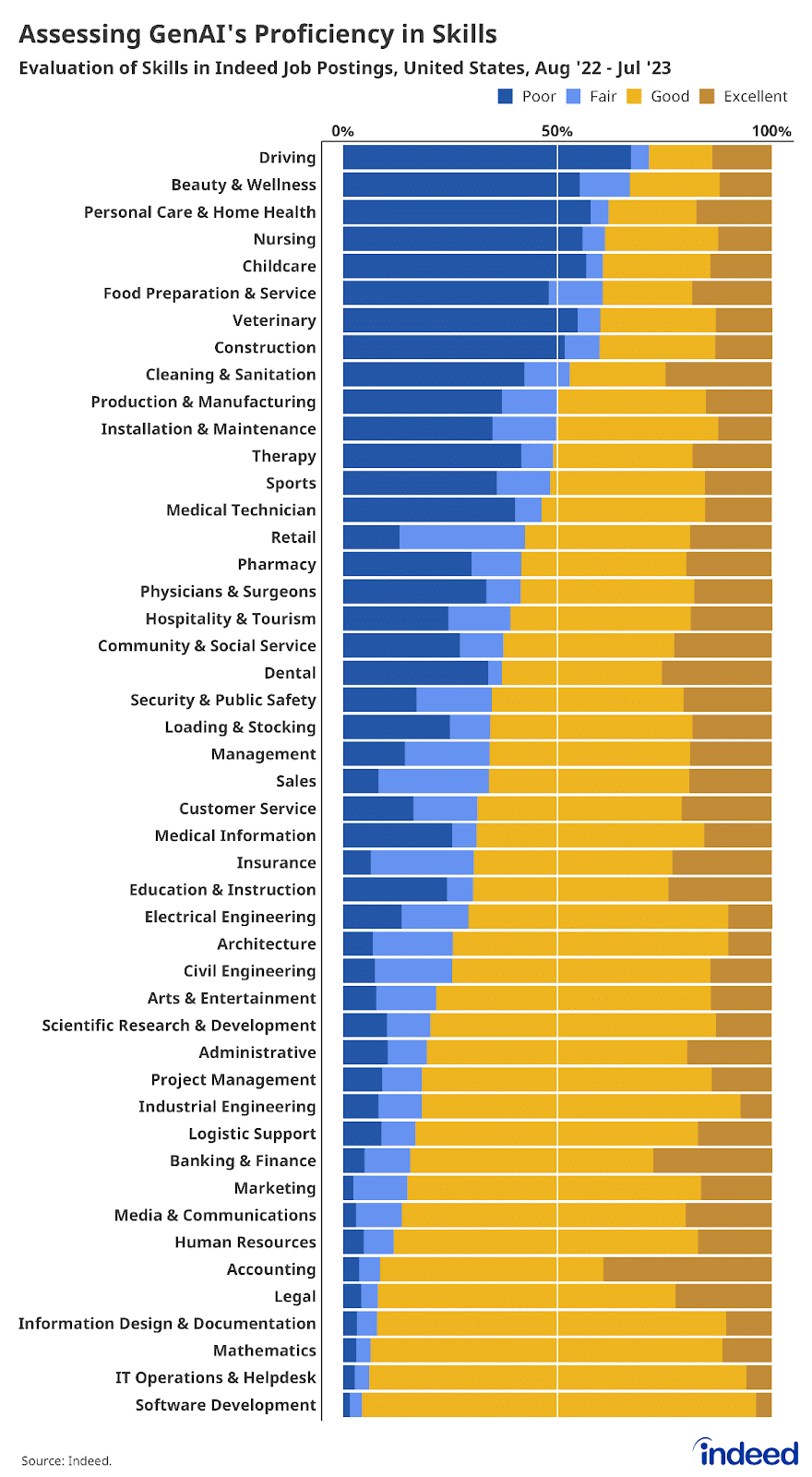
Meanwhile, “the retail and telecommunications industries are undergoing major technology upgrades,” said Cliff Jurkiewicz, vice president of global strategy at HR technology company Phenom. We are leading the expansion of artificial intelligence technology. Like previous disruptive technologies, they are creating new roles and new skill requirements for existing roles.
“Technologists have an advantage. Their skills are highly marketable, coupled with tremendous opportunities for technical roles in other industries. We also have the background and capabilities to streamline upskilling for new AI-based roles. And these new AI roles are just the beginning; others will emerge soon.”
What occupations and skills are difficult for AI to replace?
In general, the jobs least affected by artificial intelligence are those that require human empathy, dexterity, and accuracy:
- Healthcare: AI has enormous potential in the medical field, from new drug development, diagnostic support, remote surgery and treatment, to administrative tasks, but also has the potential to replace medical professionals. is low. Doctors, nurses, therapists, and counselors are many roles that are resilient to automation because they rely heavily on interpersonal relationships and emotional intelligence.
- Skilled Occupations: Skilled occupations such as electricians, plumbers, and mechanics require dexterity, problem-solving skills, and adaptability. AI struggles because these jobs often involve working in unpredictable environments. Additionally, carpenters, blacksmiths, and glassworkers require highly skilled skills and often produce unique, custom products whose jobs are unlikely to be lost to AI.
- Education: AI can help develop educational content and provide personalized learning and grading, but teachers, coaches, and other educators cannot replace mentorship. , provides guidance and emotional support.
- Social and Community Services: Social work, community support and advocacy careers rely heavily on human relationships, empathy and understanding. These jobs involve complex decision-making and problem-solving based on the unique needs of individuals and communities. AI tools can perform these roles more efficiently by providing data and support, but they cannot replace the personal relationships and judgment of human experts.
- Creative Professions: The role of AI in creating creative content is controversial, and one of the reasons why writers and actors are going on strike in Hollywood is because studios are trying to create AI-generated content. This is to limit the scope that can be replaced with scripts, audio, and video footage. But while AI can help create content, it lacks the depth that human experience and emotional connection bring to creative output.
In the Recruitment Institute’s analysis, mid-level jobs are the most interesting cases to study when determining the potential impact of generative AI on the future of work.
While retail jobs include skills that AI can perform well, such as strategy development, algorithms cannot perfect the human-to-human skills required for retail success.
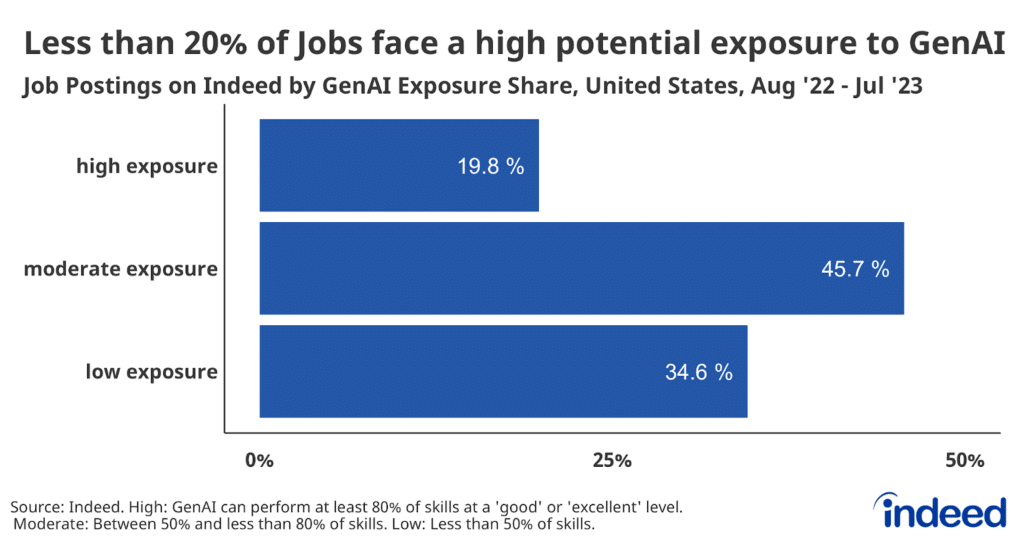
Conclusion
AI has the potential to automate tasks across a variety of industries, but some occupations may be more resilient to these innovations. Our findings on the sectors most and least exposed to potential change from AI suggest that this technological revolution will pose different challenges than previous phases of industrial and commercial automation.
In-depth, specialized, uniquely human knowledge will remain in high demand. Instead of viewing AI as a threat to employment, individuals should focus on adapting and developing these uniquely human skills that AI will find difficult to replicate.
Alex Cottran, CEO of aiEDU, expressed understanding of the general concerns about AI, especially in the context of job security: “Everything is changing so quickly, and when livelihoods can be affected, it’s really worrying.”
But Cottran emphasized that AI has the potential to increase job satisfaction if backed by appropriate training and preparation: “With the right training and preparation, AI can actually enable people to do more satisfying work. “It will be a tool that can help you specialize in a variety of occupations.”
“The key is to equip employees with the basic capabilities to collaborate effectively without being influenced by AI systems. “We want to give people the confidence, skills and autonomy to see AI as a tool that multiplies their capabilities rather than a robot that takes over their work.”
- Why Online Advertisers Should Request Website Traffic Data from Google Analytics Instead of Using SEO Tools Like MOZ or Ahrefs? - March 24, 2025
- North Carolina’s Bold Move: State Bill Proposes Investing 10% of Public Funds in Bitcoin - March 22, 2025
- Justin Sun Stakes $100 Million in Ethereum on Lido – What Does It Mean for the Market? - March 19, 2025






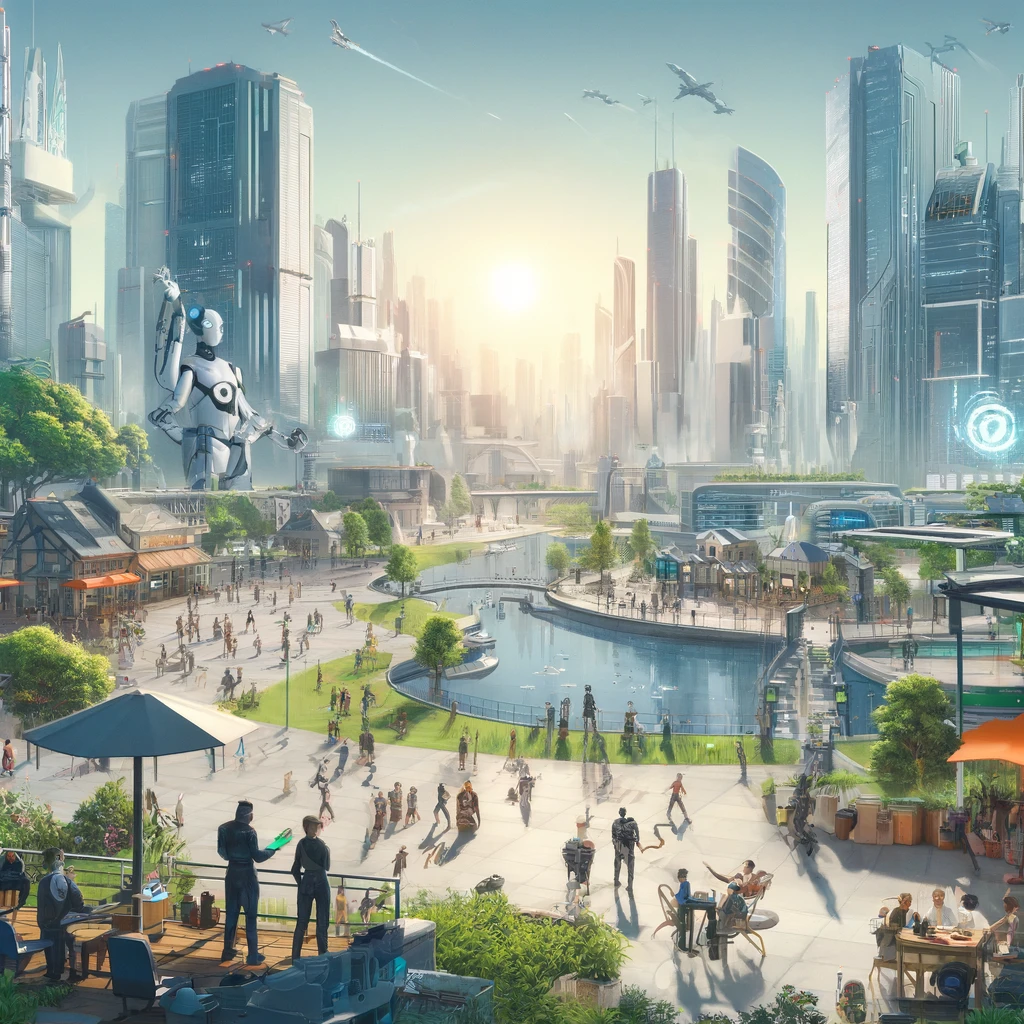




![Top 10 Leading Countries in AI Research and Technology [current_date format=Y] 22 Top 10 Leading Countries in AI Research and Technology [current_date format=Y]](https://cryptheory.org/wp-content/uploads/2023/08/ai-strategie.jpg.webp)







